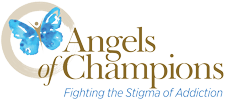If not us, then who? If not me and you…
If not now, then when… will we see an end
to all this pain…. Mathew West

IT'S TIME FOR US TO DO SOMETHING!
Our CHILDREN and GRANDCHILDREN Need Us
On December 29, 2016, I received the call that every parent prays they never receive.
What I have learned since then is nothing short of transformative in how I view what is truly important in life. As you read this, I pray you never experience the grief of losing a child…but that you gain some insight from the many lessons I have learned through my grief.
The death of my son fuels my passion to share the deeply emotional journey of despair, fear, isolation and desperation that Robbie and I experienced during the six days leading up to his death — a death that no one under a physician’s care should ever experience.
Robbie’s death was caused by the most extreme manifestation of addiction stigma ― patient abandonment. For this reason, I am deeply motivated to share my son’s story and the profound lessons I learned from navigating a journey of heartbreak I never dreamed a child of mine would ever experience.
My son’s addiction journey began seven years before his death and is what many would consider to be ‘a perfect storm’ of addiction that began with a diagnosis of ADHD his senior year of high school that was treated with the addictive medication Adderall. In addition, during his teen years, Robbie had complained of back pain which we had assumed was caused by sore muscles from the many sports he was involved in. We eventually learned he had severe degenerative disk disease that ultimately led to pain management therapies and medications, and then to back surgery at the age of 21 that further propelled an addiction storm which ultimately lead to Heroine and a revolving door of failed opiate addiction treatment programs.
Understanding the severity of his disease and frustrated with the revolving door of failed short-term programs, Robbie decided to try a more personal approach to treating his disease and sought help at an office-based pain and spine clinic that provided a medication assisted treatment program using the opioid replacement medication, Suboxone. Suboxone was a saving grace for my son, giving him the ability to work and lead a ‘normal life’– one that he clung to desperately until the very end.

Tribute to Robbie on what would have been his 30th birthday
On December 23, 2016, I drove to Raleigh, NC from our home on Smith Mountain Lake, VA to pick up my son to spend Christmas with the family. Before leaving Raleigh, we went to the pharmacy to pick up his Suboxone prescription. It was not quite ready, so we went to a McDonalds drive-thru to get some lunch, and then headed back to the pharmacy drive-thru to pick up his prescription. Before starting our drive home, I pulled up to the front of the pharmacy and I asked Robbie to throw the lunch trash into the trash can at the front of the store. Robbie quickly gathered up everything and threw the lunch trash into the trash can.
We then drove 2-½ hours home, not realizing until we were just a few miles away that his Suboxone prescription was nowhere to be found. Panicked, we then realized at that point the prescription had gotten mixed in with the lunch trash and thrown into the trash can at the front of the pharmacy. We immediately called the pharmacy and were told the trash had been emptied and placed into the trash compactor at the back of the store, making recovery of his prescription impossible.
I can still hear my son’s voice, saying to me on December 23, 2016, two days before Christmas and six days before his death…“Mom, thank goodness YOU know what happened because they would never ever believe ME.”
What Robbie did not realize at the time, and neither did I, was that the same ‘stigma’ that applied to him now applied to me as well.
Over the next six days we faced roadblock after roadblock, trying to receive help as Robbie experienced Suboxone withdrawal. His doctor’s office was closed for 10 days over the holiday with no backup doctor available to us, even though we emphatically told the office personnel this was an emergency situation. Robbie’s pharmacist recommended we go to a nearby Emergency Care Clinic, which we did. We were told that “Nobody will touch him with a 10 foot pole because he was under contract with his physician.” It was clear, No one, and I mean no one, would help us as a ‘patient contract’ specifically excludes a patient from seeking medication assistance from another healthcare provider.
Terrified of a complete relapse and desperate to alleviate the effects of Suboxone withdrawal, at the suggestion of both the office nurse of his Provider and the local pharmacist that we had been in contact with, Robbie purchased the recommended over-the-counter medications in an attempt to minimize withdrawal symptoms to hopefully feel well enough to return to work. Robbie knew if he lost his job, he would also lose his health insurance and no longer qualify for the medication assisted program he was in.
On the morning of December 29, 2016, I received the call that every parent prays they never receive. My son, Robbie, was dead.
When the end came for Robbie, he did not die from a Heroin overdose, but to an Imodium overdose in a desperate attempt to self-medicate his withdrawal symptoms due to his lost Suboxone medication.
Robbie had been intentionally abandoned by the medical community and the Providers he trusted.
I wish I had known at the beginning of Robbie’s journey what I know now, and I hope and pray that those of you reading Robbie’s story will understand clearly what barriers are in place that prevent recovery success.
When Robbie died, I knew there was something terribly wrong with our system of addiction care. I was horrified with disbelief at what Robbie and I had experienced for the six days leading up to his death. I was determined to understand how the providers treating my son could so confidently and arrogantly abandon him and ignore our pleading for help.
It took me 1-½ years to finally uncover the root cause of his death, which ultimately revealed legislation that supports the ‘most extreme manifestation of addiction stigma, Patient Abandonment.
What I have learned since Robbie’s death fuels my passion to fight addiction stigma with a fierce resolve to conquer the false narratives associated with addiction disease.
Do not misunderstand my intent of pinpointing accountability for my son’s death. Robbie took full responsibility for his addiction disease. However, Robbie never realized the possibility that he was a victim, a victim of the dangerous failures that exist within the system of addiction care, our stigma laden laws, and an unprecedented level of healthcare provider greed.
Robbie’s death was avoidable.
Robbie may have made mistakes while caught in the perfect storm of addiction, but his death was not one of them. Robbie’s death was avoidable. So, with this knowledge of experience, it is with purpose that Angels of Champions will work to reveal the profound failures within our system of addiction care and the legislative laws that support these failures, as well as support new science-based treatment models that prove to be highly successful for long-term recovery success. These new therapies are transforming the current revolving door of addiction treatment failure that is claiming the lives of our sons and daughters at an alarming rate.
I hope and pray that the lessons I have learned through the trauma of my son’s death will help me guide Angels of Champions in our mission to help prevent thousands of overdose deaths that are caused by the stigma these patients experience as they struggle to conquer their devastating disease.
Do not think for one minute that this could never be you, receiving that call that breaks your heart and leaves you picking up the pieces.
It is said that “Life’s darkest trials will often produce the most radiant results.”
So, I ask each of you to join with me to fight the stigma of addiction. If you or someone you know has lost someone to this addiction crisis, and we know there are 77 million of us across our Nation, this is YOUR OPPORTUNITY TO DO SOMETHING as we work together to be a CHANNEL OF CHANGE.
Please click here if you would like to join our Hand in Hand Campaign as we work to build a nationwide coalition of patients, parents, families, friends and concerned citizens to remove every barrier a patient faces during recovery, including legislation and policy that is significantly contributing to this crisis.
Sincerely,
Carolyn Hauck
